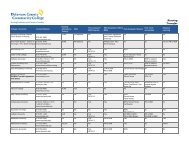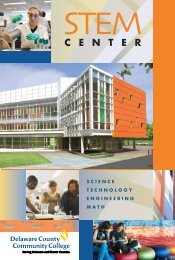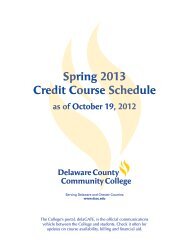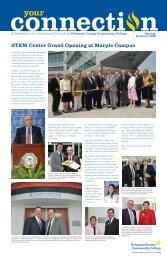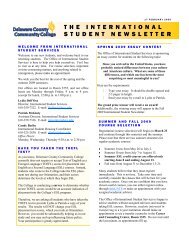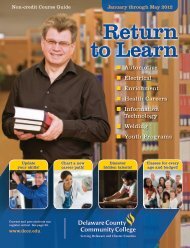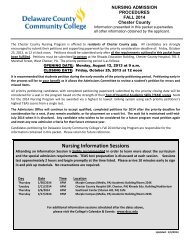2010 Catalog - Delaware County Community College
2010 Catalog - Delaware County Community College
2010 Catalog - Delaware County Community College
You also want an ePaper? Increase the reach of your titles
YUMPU automatically turns print PDFs into web optimized ePapers that Google loves.
166 COURSE DESCRIPTIONS<br />
TEL 265 Characterization, Packaging<br />
and Testing of Nanofabrication Structures<br />
This course examines a variety of techniques and<br />
measurements essential for controlling device fabrication<br />
and final packaging. Students will revisit concepts such<br />
as residual gas analysis introduced in TEL 261, optical<br />
emission spectroscopy (OES) and end point detection as<br />
introduced in TEL 263. Characterization techniques such<br />
as surface profilometry, advanced optical microscopy,<br />
optical thin film measurements, ellipsometry, and resistivity/<br />
conductivity measurement will be implemented on<br />
nanofabricated samples. Basic electrical measurements on<br />
device structures for yield analysis and process control<br />
will also be stressed. These will include breakdown<br />
measurements, junction testing, and C-V and I-V tests and<br />
simple transistor characterization. In addition, students<br />
will examine mechanical as well as electrical characterizations<br />
of nanostructures for biological/ biomedical<br />
applications. The students will perform DNA analysis by<br />
learning and performing the polymerase chain reaction<br />
for DNA replication. They will also study and manufacture<br />
microfluid channels for biological analysis. An extensive<br />
overview of biology will be given with emphasis on<br />
biocompatible materials. The students will also learn<br />
about the manufacturing issues involved in subjects such<br />
as interconnects, isolation, and final device assembly.<br />
The importance of planarization techniques such as<br />
deposition/etchback and chemical/mechanical polishing<br />
will be emphasized. Lastly, packaging procedures such as<br />
die separation, inspection bonding, sealing and final test<br />
for both conventional IC's and novel MEM and biomedical<br />
devices will be examined.<br />
Upon successful completion of this course, students<br />
should be able to:<br />
• Describe various process monitoring techniques used<br />
in nanofabrication.<br />
• Design a process flow for a NMOS transistor from<br />
wafer preparation to packaging.<br />
• Present the NMOS transistor overflow in power point<br />
format, with emphasis on process interrelationships.<br />
• Describe various material characterization techniques<br />
used in nanofabrication.<br />
• Use the C/V and I/V testing techniques utilizing devices<br />
made using the process flows of TEL 262.<br />
• Identify the equipment employed for final assembly.<br />
• Explain the processes of final assembly.<br />
• Describe the importance of nanofabricated<br />
biocompatible materials.<br />
• Replicate and quantify DNA fragments utilizing the<br />
polymerarase chain reaction and gel electrophoresis.<br />
• Describe the issues associated with metalization<br />
and planarization.<br />
• Identify the equipment associated with metalization<br />
and planarization.<br />
• Operate equipment for metalization.<br />
• Describe the test procedures associated with packaging.<br />
• Describe the issues associated with packaging.<br />
• Identify the equipment associated with packaging.<br />
Prereq. TEL 263 Coreq. TEL 264<br />
3 Credits 2 Weekly Lecture Hours<br />
2 Weekly Laboratory Hours<br />
TEL 301<br />
Basic Telecommunications<br />
This course presents an overall view of the telecommunication<br />
industry with emphasis on the systems<br />
approach. Seven major areas are discussed: basic<br />
telecommunication, television, the telephone system,<br />
satellite communication, fiber optics, fiber-optic systems<br />
and cellular radio.<br />
Upon successful completion of this course, students<br />
should be able to:<br />
• Discuss the Federal Communication Commission (FCC)<br />
and the scope of their justification.<br />
• Describe telecommunication systems and network.<br />
• Discuss the services of the telecommunication industry.<br />
• Discuss the telephone system.<br />
• Discuss the future of the telecommunication industry.<br />
Prereq. TEL 110<br />
3 Credits 3 Weekly Lecture Hours<br />
TEL 302 Radio Frequency<br />
Communication Systems<br />
RF communications, noise and special communication<br />
circuits are introduced first. Various modulation techniques<br />
are then discussed in depth. Discussion of radio receivers<br />
and transmitters, wave propagation, antennas and<br />
transmission lines forms an integral part of this course.<br />
Upon successful completion of this course, the students<br />
should be able to:<br />
• Define the basic communications system. Demonstrate a<br />
fundamental knowledge of electromagnetic waves.<br />
Understand a variety of transmission lines and their<br />
characteristics. Define the properties, characteristics and<br />
applications of antennas. Distinguish the difference<br />
between time and frequency domain. Define the<br />
concept of noise and how noise affects communications<br />
systems. Evaluate the properties of components that<br />
make up communications systems. Describe the<br />
properties and demonstrate the concepts and<br />
applications of phase-locked loops and synthesizers<br />
in communications systems. Define the properties,<br />
characteristics and applications of amplitude<br />
modulation. Define the properties and characteristics<br />
of frequency modulation. Discuss the advantages of<br />
using single sideband transmission.<br />
Prereq. TEL 301<br />
4 Credits 3 Weekly Lecture Hours<br />
2 Weekly Laboratory Hours<br />
TEL 303 Digital and Data Communications<br />
This course provides a clear and comprehensive<br />
introduction into what makes up a data communications<br />
system. Topics such as LANS, Packet Switching and ISDN<br />
are introduced.<br />
Upon successful completion of this course, students<br />
should be able to:<br />
• Define the properties and the characteristics of various<br />
types of carriers and services.<br />
• Distinguish the difference between various code sets.<br />
• Define the characteristics of synchronous and<br />
asynchronous transmission.<br />
• Discuss modems and interface. Describe system<br />
networks and architectures.<br />
Prereq. TEL 301<br />
4 Credits 3 Weekly Lecture Hours<br />
2 Weekly Laboratory Hours<br />
(TME) Mechanical Technology<br />
TME 110<br />
Materials Science<br />
This course introduces students to the structure,<br />
properties, use and design considerations of a variety of<br />
materials including ferrous metal, non-ferrous metals,<br />
ceramics and polymers.<br />
Upon successful completion of this course, students<br />
should be able to:<br />
• Determine the structure of materials.<br />
• Select the proper material (s) according to their<br />
properties and use.<br />
• Determine the properties and use of polymetric<br />
materials, plastics, polymeric coatings and adhesives.<br />
• Determine the various applications of ceramics<br />
• Determine the heat-treatment sequence of steel.<br />
• Determine the properties and use of stainless steel,<br />
copper, aluminum, nickel, zinc, titanium, magnesium<br />
and refractory metals.<br />
• Select welding processes according to joint configuration<br />
and weldability.<br />
• Identify the structure of a composite.<br />
• Determine the purposes and applications of composites.<br />
3 Credits 3 Weekly Lecture Hours<br />
TME 111<br />
Machining Technology<br />
This course provides an introduction to the knowledge<br />
and skills associated with various conventional chip<br />
making machine tools their design, application, set-up<br />
and operation. Theory and mathematical concepts and<br />
calculations associated with inspection techniques, tapers,<br />
digital readout quantifications, speeds, feeds, torque,<br />
horsepower, threading, indexing and unit cycle time<br />
determination will be covered. Emphasis will be placed<br />
on tooling and work holding requirements, and set-up<br />
and cutting tool materials (H.S.S., carbide, ceramic and<br />
diamond) selection. Additional topics include: an introduction<br />
to process planning, quality control charting -<br />
Statistical Process Control (SPC) techniques, and<br />
Geometric Dimensioning and Tolerancing (GD&T).<br />
Upon successful completion of this course, students<br />
should be able to:<br />
• Describe and perform practices and procedures<br />
required to safely complete operations involving<br />
cutoff and contour saws, drill presses, vertical and<br />
horizontal milling machines, engine lathes, pedestal<br />
and surface grinders.<br />
• Identify the basic principles and terms associated with<br />
the interpretation of drawings for the manufacture and<br />
inspection of parts, with an emphasis on Geometric<br />
Dimensioning and Tolerancing.<br />
• Implement various aspects of design, planning and<br />
organization for the production of manufactured parts.<br />
• Discuss, in general terms, the nature, properties and<br />
types of materials used to produce manufactured parts.<br />
• Refer to manufacturers' catalogs and the theory of cutting<br />
tools to determine the application and the identification<br />
of appropriate cutting tool holders, adapters,<br />
cutters and inserts, and to develop a machining<br />
operation plan, including set-up and job sheets.<br />
• Perform algebraic and trigonometric computations<br />
associated with the manufacture of piece-parts to<br />
include speeds and feeds, tapers, threads and indexing;<br />
and other mathematical calculations related to various<br />
machining parameters, machine selection, set-up and<br />
inspection of piece-parts.<br />
• Utilize engineering drawings and precision<br />
instruments to produce parts on machine tools,<br />
to include cut-off and contour saws, drill press,<br />
vertical and horizontal milling machines, engine<br />
lathe, pedestal and surface grinders.<br />
• Describe, in basic terms, the various considerations<br />
associated with special purpose machines, processes,<br />
mass production, hard and soft automation, and<br />
assembly techniques.<br />
Coreq. TCC 112 and MAT 110<br />
3 Credits 2 Weekly Lecture Hours<br />
2 Weekly Laboratory Hours<br />
TME 115<br />
Basic Technical Skills<br />
This course develops hands-on skills essential to the<br />
technician. Basic technical skills are developed by the<br />
following a project from design to completion and testing.<br />
Upon successful completion of this course, students<br />
should be able to:<br />
• Apply basic accident-prevention practices and procedures.<br />
• Interpret sketches, drawings and schematics.<br />
• Use rules, micrometers, vernier calipers, dial indicators<br />
and other instruments to make accurate measurements.<br />
• Perform basic electrical measurements.<br />
• Employ basic hand-soldering/desoldering techniques for<br />
electronic component installation.<br />
DELAWARE COUNTY COMMUNITY COLLEGE




